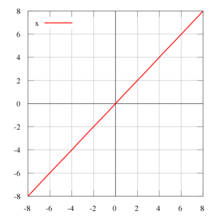Identity function

In mathematics, an identity function, also called an identity relation, identity map or identity transformation, is a function that always returns the value that was used as its argument, unchanged. That is, when f is the identity function, the equality f(x) = x is true for all values of x to which f can be applied.
Definition
Formally, if X is a set, the identity function f on X is defined to be a function with X as its domain and codomain, satisfying
In other words, the function value f(x) in the codomain X is always the same as the input element x in the domain X. The identity function on X is clearly an
The identity function f on X is often denoted by idX.
In
Algebraic properties
If f : X → Y is any function, then f ∘ idX = f = idY ∘ f, where "∘" denotes function composition.[4] In particular, idX is the identity element of the monoid of all functions from X to X (under function composition).
Since the identity element of a monoid is
Properties
- The identity function is a linear operator when applied to vector spaces.[6]
- In an n-dimensional vector space the identity function is represented by the identity matrix In, regardless of the basis chosen for the space.[7]
- The identity function on the positive integers is a completely multiplicative function (essentially multiplication by 1), considered in number theory.[8]
- In a metric space the identity function is trivially an isometry. An object without any symmetry has as its symmetry group the trivial group containing only this isometry (symmetry type C1).[9]
- In a topological space, the identity function is always continuous.[10]
- The identity function is idempotent.[11]
See also
References
- ISBN 978-0-8176-3248-9
- ISBN 978-93-80663-24-1.
- ISBN 978-0-8218-1425-3.
...then the diagonal set determined by M is the identity relation...
- ISBN 978-3-319-31159-3.
- ISBN 978-1-56072-670-8.
The element 0 is usually referred to as the identity element and if it exists, it is unique
- ^ Anton, Howard (2005), Elementary Linear Algebra (Applications Version) (9th ed.), Wiley International
- ISBN 978-038-733-195-9.
- ISBN 978-0883857519.
- ISBN 1-85233-934-9
- ISBN 978-0-486-78001-6.
- ^ Conferences, University of Michigan Engineering Summer (1968). Foundations of Information Systems Engineering.
we see that an identity element of a semigroup is idempotent.
